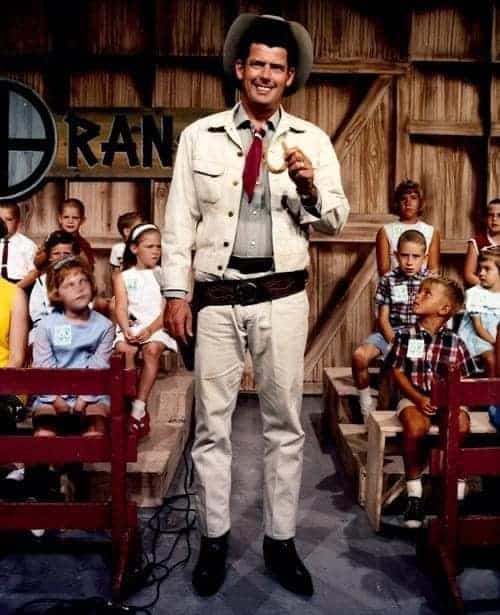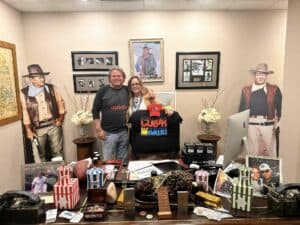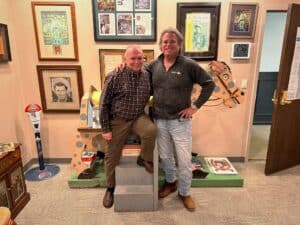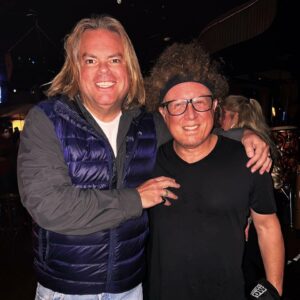Circle 4 Ranch, “Foreman Scotty” Lassoed TV Era
Ann DeFrange
Published: Sun, November 20, 1994 12:00 AM
“If you grew up here and you’re over 35, you know about Foreman Scotty. If you were a youngster then, you possibly were on the show. ” Bill Thrash started figuring last week when he learned of the death of Steve Powell, who created the memorable character for Oklahoma City’s early television audience.
As many as 25 kids every day, five days a week, year-round for 14 years visited the show, said Thrash, who was on the WKY-TV production staff during the run of the Foreman Scotty show … and that’s a common bond among an entire generation of Oklahomans.
Powell died Thursday at age 64 of an undisclosed illness.
He was host of “Circle 4 Ranch,” a daily after-school show for children from 1957 until 1971. With other live television pioneers, he created characters who live in the cultural literacy of local viewers.
He created the corral where guests sat for the show; Woody the wooden horse, where little birthday celebrants got to sit in honor on the uncomfortable saddle instead of the uncomfortable benches; the Magic Lasso, which appeared on the screen to select the lucky kid who won the Golden Horseshoe; and the Secret Password, Nicksobilly.
It wasn’t so secret to Billy Nicks, director.
“It was one of those last-minute things,” Nicks recalled. Just before a Saturday show was to be filmed live, Powell told him the station’s art department had created a slide of a lasso to superimpose on the screen. The camera was to pan around and close in on a child’s face when Powell gave him the clue.
There was no clue, Nicks said. Powell spontaneously called out the reverse version of Nicks’ name and it became a tradition.
The show came about because competitive stations were hitting a children’s market in the 1950s.
“Every show had a clown, a cowboy, Spanky McFarlane was doing the Little Rascals thing in Tulsa. Everybody thought we needed a kids’ show, a cooking show around noon and a women’s show,” Nicks said.
Channel 4, then WKY-TV, went on the air in 1949.
In 1950, WKY-TV hired Danny Williams for a kids’ show called “Gizmo Goodkins. ” He also hosted a show starring older men and women who talked about Oklahoma history.
In 1952, said Williams, now a disc jockey at KOMA radio, Channel 9 went on the air and broadcast a movie show for kids hosted by a cowboy.
“It blew me and the old ladies off the air. ” To the rescue came Dan D. Dynamo, who became, he said, a “gangbusters” character and a legend in metropolitan-area television.
From the Space Science Center, 3-D Danny labored in front of a control panel that Star Trek crews would sneer at today. But he had numerous incredible adventures with only a robot, Bazark, as supporting actor. Williams added an invisible character or two to round out the cast and broaden the plot possibilities.
Powell, an Oklahoma City acting student working in Tulsa, came in to help. Williams and Powell created the “Giant Kids Matinee” show, mostly to offset the ratings of “The Mickey Mouse Club,” Williams said.
When Williams left the station for a year, Powell filled the niche with the “Circle 4 Ranch” show. Children filled the benches, the birthday kid mounted Woody, cartoons rolled and Powell created an adventure skit series.
Williams returned to play supporting roles Powell created, such as old-timer Xavier T. Willard. By changing costumes and voices, Williams played the sidekick and all the villains on the show. Wilson Hurst, an announcer, played Cannonball McCoy, and various personnel were called in take roles when needed.
Producer Nicks admits to playing Bazark once “in a non-speaking role.
” “There was no extra pay, so what did he care,” joked Aleck Greaves, whose show-business name was Chris Daniels and who played such characters as Scoop O’Brien and Deputy Chris for Channel 4. Greaves said Powell “had my deepest admiration. He wrote it, he created everything that was on it, he directed, he produced and he starred in it. He was a take-charge guy. ” He did it, too, without a script and with little formality.
“Most of the time, he’d have something in his hand; he’d give us directions and we’d go from there. ” In the days of live television, “You’d look at the camera, get the cue and start doing it. Whatever we did went out to the people of Oklahoma.
“The people at home didn’t know what to expect. Television was what we told them it was. ” Thrash said, “Steve and Danny came up with the basic idea, then they’d ad lib around the ideas. They’d talk it through. They got into little rhythms, then they’d just do it. ” Without staff writers, Thrash said, and – unheard of in modern television – without a TelePrompTer, since there were no lines to put on a TelePrompTer.
The set was torn down every night, Nicks said, because the single studio was also used for news broadcasts.
The low-budget set was only a supply of backgrounds, benches and a fence in front.
But then there was Woody.
Woody survives in a storage room of the Oklahoma Historical Society museum. Society staff member Bill Pitts said the agency acquired the horse a few years ago and displayed it for an exhibit on early television.
Pitts said he has a barrel-like body about 6 feet long, room enough that at least three birthday celebrants could crowd on. His head nods and his saddle, Pitts reports, “looks like Naugahyde. ” Actually, said the historian, the artifact is Son of Son of Woody. Research reveals that little rear ends wore out two original Woodys and “this one was nearly worn out. ” Williams recalled that at the creative heyday of live broadcasts, he and Powell – and Sooner Shindig stars Wiley and Gene, and weatherman Harry Volkman – were perhaps Oklahoma’s biggest celebrities.
But Thrash, now an executive for the Oklahoma Educational Television Authority, saw the end of the show. “I was there the last year. It ended in the summer of ’71.
” Across America, Thrash said, “children’s programming started to change … afternoon programming was going to talk shows, action adventure shows, cartoons. ” Still, he said, “It was an extraordinary show to have that kind of run. “
BIOG: NAME:
Archive ID: 593526
© Copyright 2006-2019 GateHouse Media, LLC. All rights reserved • GateHouse News




